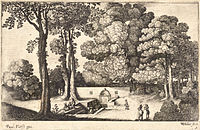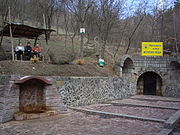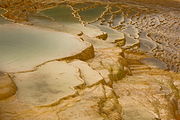- Mineral spring
-
- For various place names, see Mineral Springs (disambiguation)
 The Mineral Spring, etching by Wenceslas Hollar (1607-1677). The unidentified central European spring features a sunken stone basin and ornamental retaining wall.
The Mineral Spring, etching by Wenceslas Hollar (1607-1677). The unidentified central European spring features a sunken stone basin and ornamental retaining wall.
Mineral springs are naturally occurring springs that produce water containing minerals, or other dissolved substances, that alter its taste or give it a purported therapeutic value. Salts, sulfur compounds, and gases are among the substances that can be dissolved in the spring water during its passage underground.
Mineral water obtained from mineral springs has long been an important commercial proposition.
Mineral spas are resorts that have developed around mineral springs, where (often wealthy) patrons would repair to “take the waters” — meaning that they would drink (see hydrotherapy and water cure) or bathe in (see balneotherapy) the mineral water.
Historical mineral springs were often outfitted with elaborate stone-works — including artificial pools, retaining walls, colonnades and roofs — sometimes in the form of fanciful "Greek temples", gazebos or pagodas. Others were entirely enclosed within spring houses.
Types
For many centuries, in Europe, North America and elsewhere, commercial proponents of mineral springs classified them according to the chemical composition of the water produced and according to the medicinal benefits supposedly accruing from each:
- Lithia springs contained lithium salts.
- Chalybeate springs contained salts of iron.
- Alum springs contained alum.
- Sulfur springs contained hydrogen sulfide gas.
- Salt (saline) springs contained salts of calcium, magnesium or sodium.
- Alkaline springs contained an alkali.
- Calcic springs contained lime (calcium hydroxide).
- Thermal (hot) springs could contain a high concentration of various minerals.
- Soda springs contained carbon dioxide gas (soda water).
- Sweet springs were springs with no detectable sulfur or salt content (arguably not 'mineral' springs at all).
- Radioactive springs contain traces of radioactive substances such as radium or uranium.
Deposits
Types of sedimentary rock -- usually limestone (calcium carbonate) -- are sometimes formed by the evaporation, or rapid precipitation, of mineral spring water, especially at the mouths of hot mineral springs. (These mineral deposits can also be found in dried lakebeds.) Spectacular formations, including terraces, stalactites, stalagmites and “frozen waterfalls” can result (see, for example, Mammoth Hot Springs). One light-colored porous calcite of this type is known as travertine and has been used extensively in Italy and elsewhere as building material. Travertine can have a white, tan, or cream-colored appearance and often has a fibrous or concentric “grain”. Another type of spring water deposit, containing siliceous as well as calcareous minerals, is known as tufa. Tufa is similar to travertine but is even softer and more porous.
References
- Cohen, Stan (Revised 1981 edition), Springs of the Virginias: A Pictorial History, Charleston, West Virginia: Quarrier Press.
Categories:- Springs
- Drinking water
- Spa waters
- Water chemistry
- Bathing
- Natural environment based therapies
- Geomorphology
- Topography stubs
- Water supply stubs
Wikimedia Foundation. 2010.



